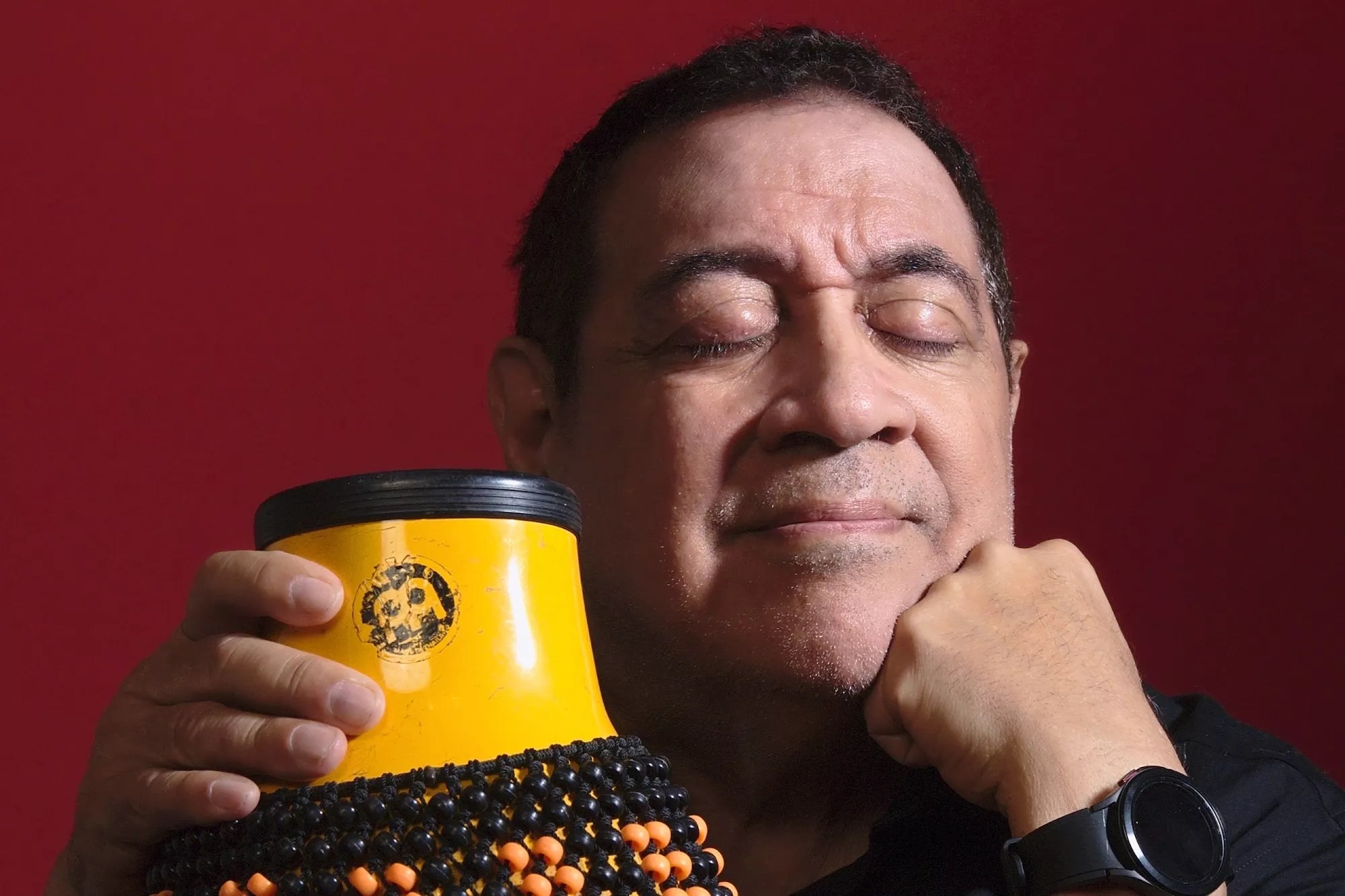
Sammy Figueroa photo

Audio By Carbonatix
On his new album, percussionist Sammy Figueroa sings.
The conga player, renowned for the indelible impression his hands have made on contemporary Latin jazz and, by anyone who knows him, his infectious laugh, makes his vocal recording debut with the song “Busco Tu Recuerdo.” The song was a hit for his father, the Puerto Rican bolero singer Charlie Figueroa when he recorded it for an album released by Colombia’s Disco Fuentes.
Charlie, a slight man with gelled hair and a bow tie who smiles wanly from photos on his record covers, was often described as bohemian. It was a polite way of saying he liked to drink.
Sammy does not recall ever meeting his father. “He was too busy living inside of a club,” he says. Charlie died from the effects of alcohol addiction on his liver in 1955 in New York. He was 34.
The senior Figueroa left behind a remarkable testimony of cult bolero classics, many written by Colombian composer José Barros, performed with the band La Sonora Malecón Club and Trio América. His son, who is now 74 years old, says he never listened to them until recently.
“I discarded him in my mind,” Sammy acknowledges. “I was very angry with him. I was in incredible denial.”
Sammy’s producer, Rachel Faro, encouraged him to make peace with his father. She suggested he start by listening to his records.
He listened.
“I said, ‘Man, this guy can sing,'” relates Sammy. “I listened more and more. The more I listened, the more I realized what a pro he was. He never went out of key.”
The more he heard, the more he realized how much he was his father’s son. Sammy’s journey to embrace his father’s spirit is captured on the album Searching for a Memory, an English translation of Busco tu recuerdo. Recorded at Criteria studios in Miami and released in July on Faro’s label Ashe Records, it includes a dream lineup for Figueroa, featuring pianist Gonzalo Rubalcaba, singer Aymee Nuviola, Ricky Rodriguez on bass, drummer Ludwig Afonso, Cuban sax player Felipe LaMoglia, saxophonist Miguel Zenon, and trumpet player John Daversa. Rubalcaba also coproduced this beautiful and multitextured concept album.
“Doing this project for me was such a blessing,” Sammy says. “All those years, I knew nothing about my father – nothing.” In addition to critical praise, the album’s release led to a music historian contacting him to send him a cache of photos of Charlie and a live recording on which he sang together with the mid-century Latin superstar Tito Rodríguez when they were 18 years old.
The music on the new album brims with pure feeling, evoking the ups and downs of Charlie Figueroa’s freewheeling artist lifestyle while it maps Sammy’s emotions as he reconsiders his father’s role in his life. Rubalcaba’s unsettling piano solos at times disrupt its nocturnal smoothness on Latin-jazz ballads sung by Nuviola on an album that is a tribute to each of the participating musician-storytellers as well as to the Figueroas, both father and son.
Sammy was born in New York City, the product of a short relationship that his mother had with Charlie, who Sammy says, never came to see him.
“He was just doing his thing,” Sammy says now. “Being so young and being out there in the public eye, especially in the ’50s, things were crazy. He was getting more famous day by day.”
When Sammy was 9 years old, his mother sent him to live with his father’s parents in Puerto Rico, seeking a better environment for a child than their rough neighborhood in the Bronx. He landed among musical family members, including his aunt Carmencita, who had performed with Charlie when they were young, calling themselves Los Hermanos Figueroa.
“I was a little kid when my father died,” Sammy says. “I had no interest in talking about it. No one mentioned him. I guess they didn’t want me to be like him.”
Still, Sammy became a musician. He started singing with trios and quartets in hotels in San Juan.
“I sang everywhere,” he recalls. “And I didn’t know why. I had a certain talent for singing and playing. But I didn’t relate it to my father because nobody talked about it.”
Sammy changed gears. He went to college and started seriously playing percussion, finding success after he moved to New York for a three-month gig when he was 20 years old and stayed on. His first band there, a “Brazilian jazz-funk band” called Raíces, recorded on Atlantic Records and once opened for Miles Davis.
Over the years, he’s released solo albums and led bands. He’s also been in demand as a side man, recording and performing with John McLaughlin, Michel Camilo (who wrote the song “When Sammy Walked in” for him), John Pizzarelli, Luther Vandross, Ashford & Simpson, and Chic.
He recently moved back to New York from Miami, where he had become a beloved fixture of the local Latin jazz scene over the last couple of decades.
It was in 2020 that he recorded one of his father’s songs for the first time when John Daversa invited him to collaborate on a pandemic album called Cuarentena: Family at Home. Daversa had the idea, asking him to perform Charlie’s hit “el último suspiro.”
Searching for a Memory was recorded in 2022, with a grant Faro received to fund the album’s making.
“Rachel was the one who said, ‘You’ve got to forgive your father because you’ve got his musical DNA,'” Sammy says.
And he has. On a new version of “El último suspiro” recorded for the album, Sammy joins Nuviola, singing part of the song.
At the end of the track, he can be heard speaking softly: “Charlie Figueroa, te quiero.”
Sammy Figueroa. With Gonzalo Rubalcaba and Aymee Nuviola. 7:30 p.m. Saturday, October 7, at the Kravis Center for the Performing Arts, 701 Okeechobee Blvd., West Palm Beach; 561-832-7469; kravis.org. Tickets cost $55 to $65.